May eNews 2022
Equipping Assistant Research Officers with Media Literacy and Skills
The Assistant Researcher Officers (AROs) of the National Assembly and the National council noted the importance of ethical conduct in gathering verified information as a critical skill for them in the age of Infodemic.
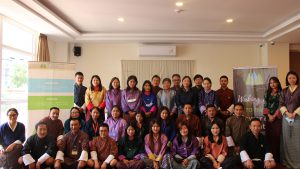
30 Assistant Research Officers attended the Media and Democracy Literacy from the 4th to the 6th of May 2022 at Thimphu Deluxe Hotel.
Participants discussed how they had been blindly consuming news and never questioning its veracity.
“Until now, I have never thought about the core values that should be considered and I have been consuming news blindly,” said Sonam Wangmo from the National Assembly. Additionally, Karma shared that he felt more equipped with journalistic ethics since his position demands news writing.
On the last day of the workshop, the participants developed social media guidelines for families, workplace, children, and content creators.
UNDEF supported this project.
BCMD at the Department of Local Government
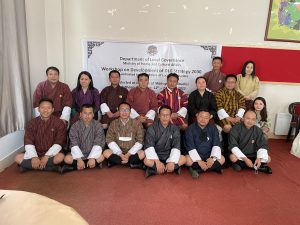
Following a peer-learning workshop at the Gross National Happiness Commission in April, BCMD attended a stakeholder meeting at the invitation of the Department of Local Government under the Ministry of Home and Cultural Affairs for the local government strategy formulation workshop on 12th May 2022. The workshop featured works carried out by BCMD in areas of capacity building for the local government functionaries.
Many participants highlighted the need for greater inter-sectoral collaboration to achieve decentralised planning and decision-making.
Gearing Towards Guiding Civic Competency in Students
BCMD pilot-tested Nurturing Participatory Representation for Civic-competent Students workbook with 20 Student Representatives and six teachers from six schools of Paro for two days. The participants shared the usefulness of the workbook in guiding student representatives to become civic-competent citizens.
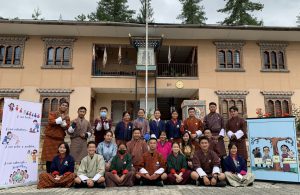
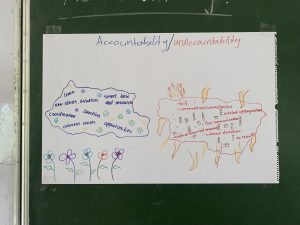
BCMD also met with students from the Paro College of Education who are implementing some Local Action Projects. The students shared the progress of their LAPs.
We thank Bhutan Foundation for its support of this project.
The Druk Journal Conversation on “Democracy Today”
The Druk Journal Conversation on the theme ‘Democracy Today’ was held on 6th May. 30 Research Assistants from the National Assembly and the National Council attended the Forum, including participants from the Election Commission of Bhutan (ECB), Bhutan Infocomm and Media Authority (BICMA), and political parties and the media.
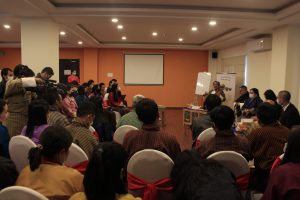
The Conversation discussed a wide range of topics from political ideology to the teaching of civics in the Bhutanese Education system and democracy as a means to realise Gross National Happiness:
- The “conduct” of politics has created tensions, division and a lack of discourse among politicians and the people.
- Bhutan’s democracy is yet to be inclusive; the number of women in parliament in Bhutan is still far below the global average.
- Civics curriculum needs improvement to focus on the role of citizens rather than studying only procedures and institutions.
- Democratic culture exists when people want it.
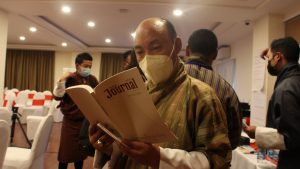
We thank UNDEF for funding the Conversation.
Bhutan Democracy Forum, 2022
The pandemic has adversely impacted Bhutan’s economy, and it is yet to revive fully. Taking advantage of the opportune moment, the Bhutan Democracy Form 2022 was organised on 25th May on the theme “Equitable Prosperity through Inclusive Growth” in partnership with RUB.
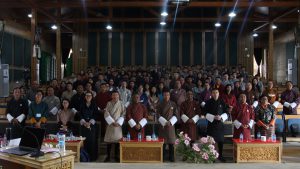
The panellists, from diverse sectors, deliberated on numerous issues and made recommendations to build an inclusive economy:
- Stabilising Bhutan’s volatile economy is critical for inclusive growth.
- Hydropower is vulnerable to climate change; there is an urgent need to diversify the economy.
- Government should invest in R&D to forecast economic opportunities and shocks to guide entrepreneurs and the private sector.
- Financial and business literacy are critical to contributing to inclusive growth.
- Citizens need to shift from a “welfare” to a “workfare” mindset.
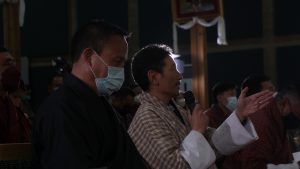
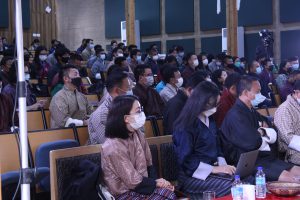
About 130 participants from government agencies, political parties, civil society organisations, the media, academic institutions and schools attended the Forum.
Helvetas, European Union and International IDEA supported the Forum.
